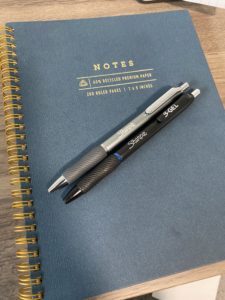Last year, I made it about 25,000 words into a novel project (tentatively called Rassam’s Eye) and stalled out. I don’t think that project is dead – there were some good ideas there. However, I started to feel that working on it had become more “should” than a “want,” so I set it aside. Maybe it will come back! Even if it doesn’t, most writing is compostable – and the stuff that isn’t at least provides useful meta-functions like conditioning the mind and habituating a fluency with converting thoughts to words.
Since then, I’ve been trying to embrace more non-digital tools that help me get away from the screens, especially after many long hours sitting in front of two for work. That shift has led to two things that have seeded a new sapling of an idea: 1) I’ve been outside more – enjoying the changing seasons while reading or writing, walking the dog, etc and 2) I’ve been filling up physical notebooks with musings, sketches, observations on nature, and various longhand scrivenings.
I’ve discovered – after years of sneering at longhand writers for being old-school technophobes unwilling to embrace modern tools – that physically putting pen to paper has actually been great for open-ended, generative thinking.
Eventually, a manuscript needs to be typed – even if only in part to share with the writing critique circle. Revision and editing are far more efficient on a computer. And certainly, submission to anyone for consideration and eventual publication (publisher or self) requires a typed electronic manuscript. But after a few months now of experimenting with longhand, I think I’m convinced that ink marks on a dead tree is the way to go for early-stage work like musing and planning… and perhaps even the first draft?!
So here’s my summer creative writing project: Between May 1 and August 31, I will fill this 200-page notebook with a shitty first draft of a new novel – written longhand.
Two-hundred pages in 4 months means something like 1.6 pages per day. (Or, as the project manager in me thinks about it: 2 pages per day baseline with 40 pages of schedule margin for inevitable dropped days). At the typical estimate of 250 words/page, 200 pages should equal a 50,000 word short novel draft (or start to a longer one).
I’ve got a story idea (more later) and have been laying out the key elements. Two pages a day sounds like the right combination of something to be accountable too, but not so difficult in the midst of life craziness that it’s liable to flame out (coughNaNoWriMocough). And pulling out a notebook for a few minutes in the middle of all the major life changes happening right now sounds a lot more doable, pleasant, and productive than finding time to sit in front of a laptop screen and all its attendant distractions.
I’ll find a way to put a WIP widget or something in the side bar if folks want to follow along, and to keep track myself. We’ll see how it goes! (And join me if you want to…)

Nalin, I like this new project idea! looking forward to see the completed notebook.
Ammi
This is my first time at your blog, Nalin. It’s beautiful.
I use physical notebooks of all sizes, too. Mostly notes to myself and for stories. Sometimes I can’t find what page the note I’m looking for is on. Oh, I use colorful paperclips to help me. But still, I have trouble finding things. You have the right idea. One notebook; one novel. All the luck with this next project. You can reach my blog at https://www.victoriamarielees.com/
Thanks for stopping by! I’m glad you found it and left your note. I have three notebooks actually – not by premeditated design but just how it happened. A smaller one that fits in the side pocket of my backpack for “on the go” ideas and notes, a fairly standard Mead college-ruled softcover for “concept work” – brainstorming, ideas, and sketches, and finally the “project” notebook (shown in the image) which is the one I chose that seemed to feel right for capturing the actual prose draft of the novel.